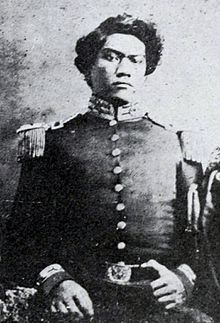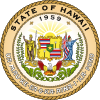Portal:Hawaii
The Hawaii Portal Hawaii (/həˈwaɪ.i/ ⓘ hə-WY-ee; Hawaiian: Hawaiʻi [həˈvɐjʔi, həˈwɐjʔi]) is an island state of the United States, in the Pacific Ocean about 2,000 miles (3,200 km) southwest of the U.S. mainland. One of the two non-contiguous U.S. states (alongside Alaska), it is the only state not on the North American mainland, the only state that is an archipelago, and the only state in the tropics. Hawaii consists of 137 volcanic islands that comprise almost the entire Hawaiian archipelago (the exception, which is outside the state, is Midway Atoll). Spanning 1,500 miles (2,400 km), the state is physiographically and ethnologically part of the Polynesian subregion of Oceania. Hawaii's ocean coastline is consequently the fourth-longest in the U.S., at about 750 miles (1,210 km). The eight main islands, from northwest to southeast, are Niʻihau, Kauaʻi, Oʻahu, Molokaʻi, Lānaʻi, Kahoʻolawe, Maui, and Hawaiʻi, after which the state is named; the latter is often called the "Big Island" or "Hawaii Island" to avoid confusion with the state or archipelago. The uninhabited Northwestern Hawaiian Islands make up most of the Papahānaumokuākea Marine National Monument, the largest protected area in the U.S. and the fourth-largest in the world. Of the 50 U.S. states, Hawaii is the fourth-smallest in land area and the 11th-least populous; but with 1.4 million residents, it ranks 13th in population density. Two-thirds of Hawaii residents live on O'ahu, home to the state's capital and largest city, Honolulu. Hawaii is among the country's most demographically diverse states, owing to its central location in the Pacific and over two centuries of migration. As one of only seven majority-minority states, it has the only Asian American plurality, the largest Buddhist community, and largest proportion of multiracial people in the U.S. Consequently, Hawaii is a unique melting pot of North American and East Asian cultures, in addition to its indigenous Hawaiian heritage. Settled by Polynesians sometime between 1000 and 1200 CE, Hawaii was home to numerous independent chiefdoms. In 1778, British explorer James Cook was the first known non-Polynesian to arrive at the archipelago; early British influence is reflected in the state flag, which bears a Union Jack. An influx of European and American explorers, traders, and whalers soon arrived, leading to the decimation of the once-isolated indigenous community through the introduction of diseases such as syphilis, tuberculosis, smallpox, and measles; the native Hawaiian population declined from between 300,000 and one million to less than 40,000 by 1890. Hawaii became a unified, internationally recognized kingdom in 1810, remaining independent until American and European businessmen overthrew the monarchy in 1893; this led to annexation by the U.S. in 1898. As a strategically valuable U.S. territory, Hawaii was attacked by Japan on December 7, 1941, which brought it global and historical significance, and contributed to America's entry into World War II. Hawaii is the most recent state to join the union, on August 21, 1959. In 1993, the U.S. government formally apologized for its role in the overthrow of Hawaii's government, which had spurred the Hawaiian sovereignty movement and has led to ongoing efforts to obtain redress for the indigenous population. (Full article...) This is a Featured article, which represents some of the best content on English Wikipedia..
James Wood Bush (c. 1844–45 – April 24, 1906) was an American Union Navy sailor of British and Native Hawaiian descent. He was among a group of more than one hundred Native Hawaiian and Hawaii-born combatants in the American Civil War, at a time when the Kingdom of Hawaii was still an independent nation. Enlisting in the Union Navy in 1864, Bush served as a sailor aboard USS Vandalia and the captured Confederate vessel USS Beauregard, which maintained the blockade of the ports of the Confederacy. He was discharged from service in 1865 after an injury, which developed into a chronic condition in later life. The impoverished Bush was unable to return to Hawaii for more than a decade, during which time he traveled through New England and much of the Pacific. Back in Hawaii, he worked as a government tax collector and road supervisor for the island of Kauai, where he settled down. In later life, he converted to Mormonism and became an active member of the Hawaiian Mission. After the annexation of Hawaii to the United States, Bush was recognized for his military service, and in 1905 was granted a government pension for the injuries he received in the Navy. He died at his home on Kauai on April 24, 1906. (Full article...) This is a Good article, an article that meets a core set of high editorial standards.
William Hoapili Kaʻauwai (c. 1835 – March 30, 1874) was a Hawaiian high chief and politician, and religious deacon of the Kingdom of Hawaii. He served two terms as a member of the House of Representatives of the Legislature of the Kingdom in 1862 and 1870. He became the only Native Hawaiian to be ordained a deacon of the Anglican Church of Hawaii and traveled with its founder Queen Emma to Europe between 1865 and 1866, circumnavigating the globe upon his return eastward via New Zealand. (Full article...) Selected Picture - 'Ōlelo (Language) -This section is here to highlight some of the most common words of the Hawaiian Language, ʻŌlelo, that are used in everyday conversation amongst locals.
Mahalo
Thanks Mahalo nui loa, Thanks very much Note: It is often misconstrued among malihini that mahalo means rubbish/trash because most rubbish cans have the word mahalo on them. State Facts
State Symbols:
Selected article -Kaʻahumanu (March 17, 1768 – June 5, 1832) ("the feathered mantle") was queen consort and acted as regent of the Kingdom of Hawaiʻi as Kuhina Nui. She was the favorite wife of King Kamehameha I and also the most politically powerful, and continued to wield considerable power as co-ruler in the kingdom during reigns of his first two successors. (Full article...) Did you know? -
Hawaii News
Wikinews Hawaii portal
Quotes -"Hawaii has always been a very pivotal role in the Pacific. It is in the Pacific. It is a part of the United States that is an island that is right here." — Dan Quayle On this day...There are no anniversaries listed for this day. Related portalsTopicsCategoriesAssociated WikimediaThe following Wikimedia Foundation sister projects provide more on this subject:
SourcesDiscover Wikipedia using portals |

























